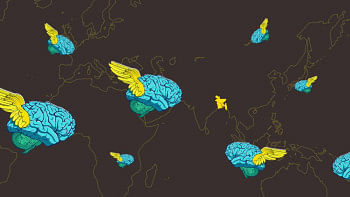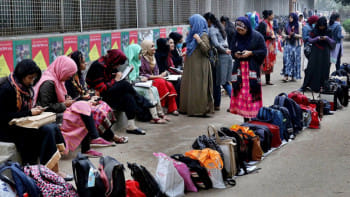Are we listening to the young people?

A just-unveiled study by the Citizen's Platform for SDGs, Bangladesh has given us some sobering statistics regarding what our young people are thinking. The data reveals that young people are worried about their present and future. Constraints on freedom of expression, widespread corruption, joblessness and poor governance in the country are some of the factors behind their frustrations.
Importantly, around 43 percent of those surveyed are hesitant about exercising their freedom of expression, while 41.4 percent have demanded the scrapping of the notorious Digital Security Act (now replaced by Cyber Security Act) and similar laws as well as administrative measures that severely restrict freedom of expression. Meanwhile, 69.4 percent believe that Bangladesh's development is being hampered by corruption and nepotism. More than half of the respondents are registered voters, but they have never voted in the national elections.
With a sample size of more than 5,000 people aged between 18 and 35, this is a study that deserves to be taken seriously and properly acted upon. The pessimism reflected in it demonstrates how – despite all the infrastructural development achieved by the government – some fundamental prerequisites for a thriving democracy are starkly missing. The result is that young people are becoming ever more disillusioned with our political culture that seems to have ignored their needs and aspirations.
Being able to voice their opinion or protest injustices and having financial security are important to young men and women. But the reality is, many are under claustrophobic conditions. They are deprived of quality education and the right skills to be gainfully employed. They are not allowed to say what they feel and must live in fear of being incarcerated if they do. Most young people have to confront the reality of not getting the jobs that will provide them with a secure, decent future. Is this how we are utilising our much-talked-about demographic dividend?
We are clearly at a critical juncture and must make decisions to change the bleak outlook of the youth. Young people must feel free to express their opinions without the threat of repercussions from the state. They must have access to quality education, skills training and job opportunities. According to the survey, around 60 percent of the respondents suggested having a registration system for the unemployed youth so that they can get jobs. Forty-eight percent recommended a low interest rate loan for young entrepreneurs.
Therefore, political parties, especially the ruling party, must wake up and address these issues that profoundly affect the well-being and worldview of the youth. Not doing so will not bode well for Bangladesh's future, which is overwhelmingly dependent on its young population in every step of its development.

 For all latest news, follow The Daily Star's Google News channel.
For all latest news, follow The Daily Star's Google News channel. 












Comments